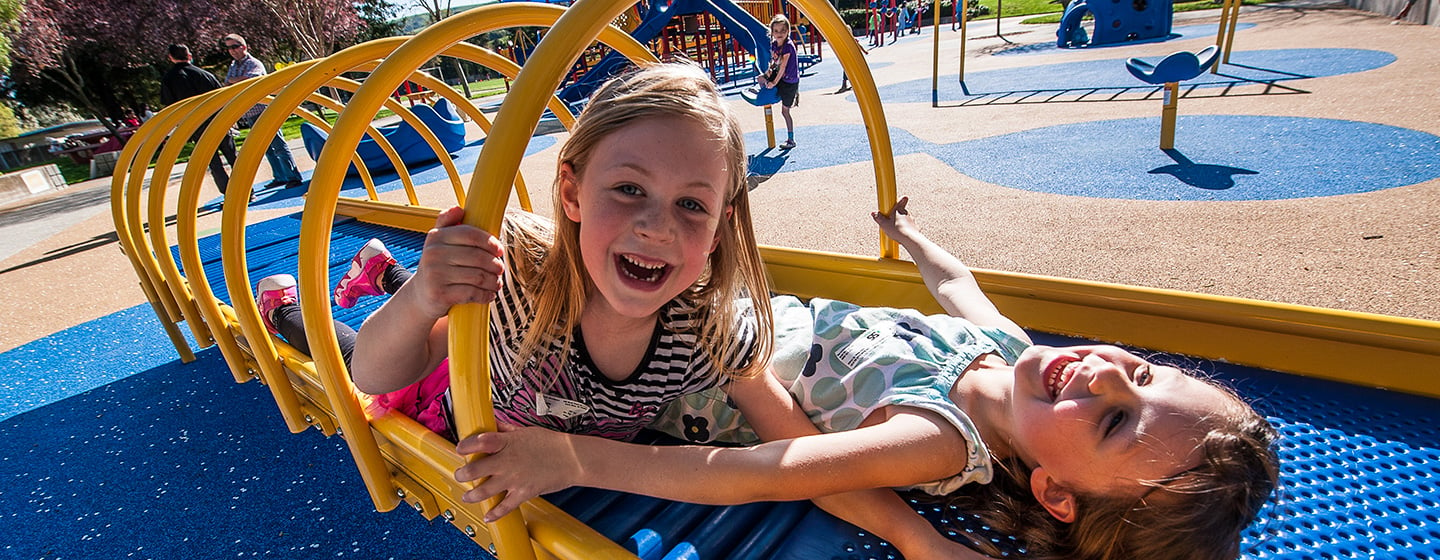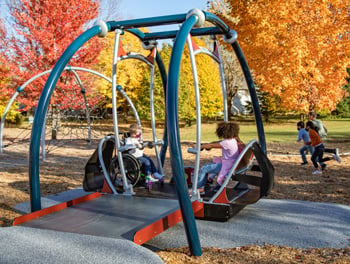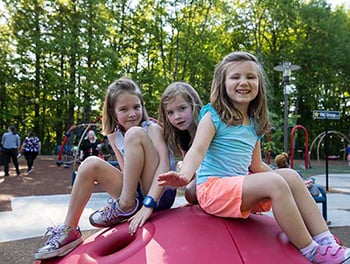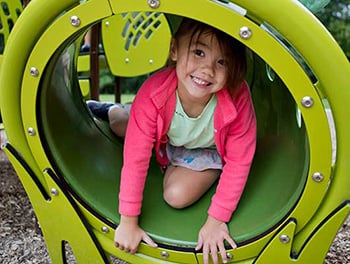Benefits of Inclusive Play

For a better tomorrow, we play today
Playgrounds are a place for fun and learning that support a child's cognitive, emotional, physical and social development. The play that happens on a playground is transformative for both the brain and the body teaching us how to interact with one another, how our bodies move and figuring out how to master new skills. These benefits of play are not exclusive to typically developing children—adults and children of all abilities need the opportunity to experience all the benefits play has to offer developmentally.
Meets individuals where they're at: Ensuring a playground is welcoming to everyone creates an environment where the differences in skill and ability melt away. A well-designed inclusive playground provides opportunities for everyone to practice a range of skills and encourage active, independent and meaningful play for all. Both a physical and social event, inclusive play is not solely about accessibility, but what experiences happen once an individual gets there.
Fosters critical social development: According to a study by Elksnin and Elksnin, more than 85 percent of adults with disabilities who report losing their jobs attribute it to a lack of social skills. Play is where we learn from each other and the more opportunities we create for that face-to-face play and social interaction, the more these life-long skills will be developed.
 Promotes imaginary play: Imaginative play is one of the ways children “try on” the many roles and activities of life and helps develop “whole child” learning.
Promotes imaginary play: Imaginative play is one of the ways children “try on” the many roles and activities of life and helps develop “whole child” learning.
Facilitates cooperation and camaraderie: Components like the We-Go-Swing®, We-Go-Round®, We-saw™ and Sway Fun® Glider encourage cooperation and build camaraderie as all play together.
Creates opportunities to play quietly:Components like the Cozy Dome® and Sensory Tunnel provide a place where children can slip away to explore quieter play adventures.
Encourages everyone to engage meaningfully: An inclusive playground also enables adults of varying ages and abilities the chance to actively engage with the children in their care. The playground thus becomes a truly multigenerational gathering space for community enjoyment, socialization, healthy bodies and imaginative fun.
Check out our Inclusive Play Brochure and Sensory Play Infographic about the benefits of inclusive play and how to make play accessible.
Play for all
An inclusive playground design includes a balance of play experiences that are beneficial to children of all abilities, at all stages of development and at all levels of sensory engagement. When playgrounds are built with everyone in mind, it sends the message to the community that everyone is meant to be there, that everyone matters and everyone is meant to play.
Play for all offers an opportunity for everyone to be involved and a part of the action. An inclusive play space can offer a sense of belonging and a place to find acceptance. It’s an opportunity to be an active participant in the fun, instead of watching it from the sidelines.
Traditional accessible playground design focuses on user access, typically for children with orthopedic impairments.
Accessibility is part of the equation, a truly inclusive playground goes beyond accessibility to consider individuals with the following disabilities as well:

- Specific learning disabilities
- Speech or language impairment
- Autism
- Developmental delay
- Intellectual disability
- Emotional disturbance
- Hearing impairment
- Orthopedic impairment
- Traumatic brain injury
- Blind/Visual Impairment
- Deaf/Hard of Hearing
It’s so important for playgrounds—especially inclusive playgrounds—to provide a variety of developmental options for kids to choose from. Providing multisensory experiences can be good because using more than one sense at a time helps to build the brain more quickly. However, kids with disabilities may need to experience that play differently. Some may require additional sensory input, others do better with less. Some may prefer to practice this input more frequently, others less frequently. Offering a variety of stimulating equipment will ensure everyone has options as to how they want to engage in play.
Our inclusive play design philosophy, influenced by the seven principals of universal design, is not about fixing a space for one specific disability demographic, it’s about creating a space that everyone can use. Incorporating that into the planning stage helps set the tone for the entire project from the playground and splash pad to the bathrooms, pathways and site amenities. This allows as many as people as possible to have a meaningful experience in the space.
Creating an inclusive community
Building an inclusive playground is no longer just the altruistic thing to do, it provides lasting benefits to a community by showing its members that everyone matters, everyone is invited, and we expect everyone to come, engage, play and contribute together.
 Cities across the country are recognizing that investing in their parks and infrastructure is going to increase the social equity and social opportunity for more people. Communities that build spaces that are truly invitational to all are reaping numerous benefits and becoming gathering places for visitors near and far. Inclusivity is a priority for all communities because not doing so, excludes a large demographic. According the CDC, one in four Americans have some type of disability making it the largest minority group in the country. It’s also the only minority group a person can join at any time.
Cities across the country are recognizing that investing in their parks and infrastructure is going to increase the social equity and social opportunity for more people. Communities that build spaces that are truly invitational to all are reaping numerous benefits and becoming gathering places for visitors near and far. Inclusivity is a priority for all communities because not doing so, excludes a large demographic. According the CDC, one in four Americans have some type of disability making it the largest minority group in the country. It’s also the only minority group a person can join at any time.
People with disabilities wield high purchasing power too and can make an impact on a local economy. Since most people with disabilities travel with their friends, family and/or caretakers their economic impact is estimated at more than $58 billion. By offering inclusive options, communities are transformed into a destination with more ways to stimulate the economy.
But most importantly, inclusive playgrounds give children with disabilities a sense of belonging. When a community invests in an inclusive play environment where everyone can come together regardless of race, gender, ability status and play, the bias around differences disappears. Supporting every person who comes to use a space and play sends a message from the community that everyone is a valuable member of the group.
We believe all kids are created equal.
That's why we create play environments using inclusive playground equipment that welcome kids and families of all abilities to learn, play and grow together.